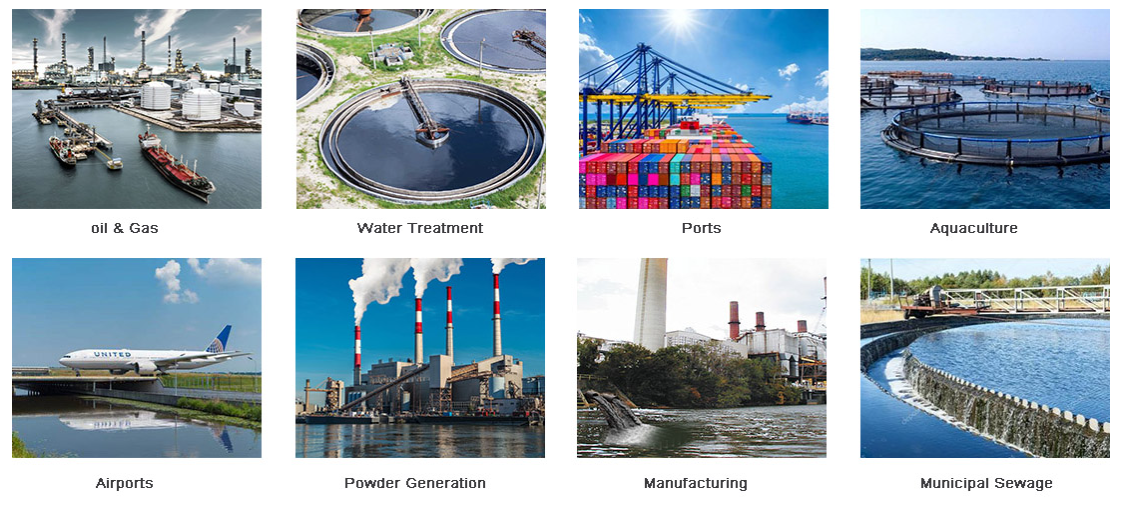
UV Fluorescence Non-contact Oil Spill Detection Sensor
Non-Contact Oil Spill Detection Sensor Overview
Desun Uniwill UV Fluorescence Non-contact DSOD703 Oil Spill Detection Sensor is a non-contact sensor for detecting oil on water in real time. It uses oils natural fluorescence to detect anything from marine diesel to vegetable oil to jet fuel and alerts you to unsuspecting oil spills immediately. It provides 24/7 industrial and environmental water monitoring at effluent discharge or influent intake points.
Technical parameter:
| Product Name | Oil Spill Detection Sensor |
| Model | DSOD703 |
| Certificate | CE |
| Principle | UV fluorescence method |
| Measuring Distance | 0-2m and 0-10m from surface |
| Sensitivity | 1μm (micron) oil film |
| Response Time | <10s |
| Minimum Test Intervals | 5s |
| Interface | RS-485, Modbus RTU |
| Power Supply | 12V DC |
| Power Consumption | < 1.5 W |
| Dimensions (L x Ø) | Φ110mm*585mm |
| Weight | 3350g |
| Protection Level | IP68 |
| Storage Temperature | -20-80°C |
| Working Temperature | 0- 50°C |
| Housing Material | SS316/ Titanium/ PVC |
Features and Benefits of Oil Spill Detector
-Long-distance Non-contact Detection Sensor
With non-contact optical monitoring technology, the sensor is unaffected by marine bio-fouling or oil contamination, requiring no cleaning, no maintenance, and easier installation. Long-distance detection of oil, maximum monitoring distance of 10m above the water surface.
-High Sensitivity
Using UV LED light to excite oils native fluorescence, the sensor can detect oil films down to 1 µm layer, minimizing false alarms.
-Online 24/7 Monitoring
24-hour continuous real-time monitoring, no daytime or nighttime limitations.
IP68 Waterproof Rating
Rugged IP68-certified sealed design for harsh environments.
-Long Lifetime
Lifetime (>2 years), built-in system calibration, maintenance-free, low power operation (< 10W).
-RS485 Output Signal
It is equipped with an RS-485 interface that allows easy and fast sensor configuration via Modbus. It can be easily connected to the monitoring system. DSMC5100 can be equipped with it to read real-time monitoring data, and the data storage function provides users with a basis for analyzing the data.
Application Areas of Non-contact Oil Leak Detection Sensor
-Waste Water
Monitors oil contamination in wastewater treatment facilities, ensuring compliance with environmental standards.
-Hydro Dam
Detects oil leaks from machinery and equipment, helping to prevent contamination in hydroelectric power reservoirs.
-Airports
Provides continuous monitoring for potential fuel and oil leaks in airport water runoff, protecting surrounding ecosystems.
-Oil Refinery
Enables early detection of oil spills and leaks in refineries, improving environmental safety and operational efficiency.
-Shipping Ports & Harbor
Monitors harbor water for accidental oil spills, facilitating immediate response and pollution control in busy port areas.
-Manufacturing
Helps detect oil leaks in industrial settings, reducing environmental impact and ensuring cleaner operations.
-Oil Platform
Continuously monitors offshore oil platforms to detect spills and leaks in real-time, minimizing ocean contamination risks.
-Powder Plant
Detects oil leaks in powder production facilities, reducing contamination risks in sensitive production areas.
-Drinking Water
Monitors sources of drinking water to ensure they remain uncontaminated by oil, safeguarding public health.
-Irrigation Canal
Ensures that irrigation channels remain free of oil pollutants, protecting agricultural water quality.
-Fuel Depot
Monitors storage and handling areas at fuel depots, detecting leaks before they impact the environment.
-Aquaculture
Detects oil contamination in aquaculture facilities, protecting the quality of water for aquatic farming.

- หน้าหลัก หน้าหลัก
- สินค้าอุตสาหกรรม สินค้าอุตสาหกรรม
- สินค้าเซนเซอร์ สินค้าเซนเซอร์
- บริการของเรา บริการของเรา
- บทความและข่าวสาร บทความและข่าวสาร
- ติดต่อเรา ติดต่อเรา



